Body Point Stimulations to Stop Itchy Skin
Skin itching is annoying that can easily disturb daily activities and ruin a peaceful night sleep. It is necessary to resolve the problem timely. Traditional Chinese Medicine (TCM) has many methods to stop itching, and body point stimulations are often part of the management. It can be a way of quick relief for acute cases sometimes.
From a TCM perspective, body parts are linked up by the meridian system to form an organic whole, in which all components dependent and restrict each other physiologically, and they also influence each other pathologically. External skin changes reflect internal problems of the organs, blood and qi (vital energy), and meridians. For example, liver rules eyes, skin rashes in the eye lids are associated with liver meridian; lung rules nose, skin rashes in the nose are associated with lung meridian; kidney rules ears, ear rashes are associated with kidney meridian; spleen rules mouth, mouth sores are associated with spleen meridian; heart rules tongue, bumps on the tongue are associated with heart meridian. The order and arrangement of meridian flow on the body surface is an important factor for TCM physicians to evaluate skin problems and find out the corresponding states of internal organs or meridians.
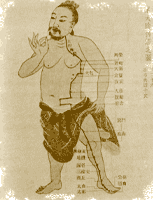 |
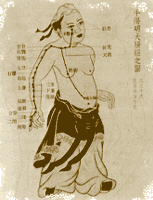 |
| Spleen and Large Intestine meridians |
Qi (vital energy) and blood are continuously circulating through the meridian system, but they flow differently among the meridians. Skin problems that are hard to treat or frequent flare up may be related to it. When skin rashes occur on meridian regions that have abundant qi and blood flowing, such as the stomach and large intestine meridians, the treatment is easier; when skin rashes occur on meridian regions that have abundant qi but less blood flowing, such as the triple burner and gall bladder meridians, the treatment is relatively harder. In general, skin problems occurred on the yang meridian regions are relatively easy to treat and heal, skin problems occurred on the yin meridian regions are likely to be chronic.
It is a routine for TCM physician to consider the above factors during clinical evaluation and designing treatment for skin problems.
Acupuncture and moxibustion therapies to stop itchy skin
Acupuncture and moxibustion regulate the meridians, improve blood and qi flowing of the skin, and thus help easy itchy conditions. There are plenty of evidences that acupuncture and moxibustion can inhibit inflammatory reactions and calm down the activities of nerve endings. For anti-itch purpose, physicians mainly stimulate body points along the spleen and large intestine meridians, which aim to clear heat, cool blood, nourish yin, enrich blood, eliminate wind and stop itching. Below are some acupuncture protocols for skin itching:
- Acupuncture protocol (I) Selected points: qu chi (Li 11), he gu (Li 4), xue hai (Sp 10), ge shu (Bl 17), wei zhong (Bl 40), tian jing (Sj 10); apply with reduction techniques.Method: after the needles are inserted, twirl or rotate for a while and then retain for 15~30 minutes. Apply one or two times daily during acute attacks; apply once every two days in chronic cases. For some women, if their itching is associated with menstrual periods, they should start acupuncture therapy 3~5 days before the period comes.Analysis: itchy skin is mainly associated with wind pathogens attacking the superficial body, qu chi and he gu belong to the large intestine meridian, stimulating them can smooth circulation and clear pathogens on the skin; xue haiis specialized in treating blood diseases, when it works with the qu chi and he gu, the resulted therapeutic effects are dispersing wind and cooling blood; wei zhongis a cleft point of blood, and ge shu is an influential point of blood, the two are specially for treating skin problems that deeply involved the blood aspect; tian jing is the sea point of the triple burner meridian, stimulating it can facilitate circulation in the meridian and promote the skin to expel the accumulated heat. For clinical applications, some assistant points will be added to fit for individual conditions. For example, itching associated with menstrual periods, additional points like guan yuan shu (Bl 26), gan shu (Bl 18), shen shu (Bl 23) will be stimulated to regulate the Thoroughfare Vessel and Conception Vessel, in order to resolve menstrual related problems.
- Acupuncture protocol (II)
Major points: qu chi (Li 11), he gu (Li 4), xue hai (Sp 10), zu san li (St 36), ge shu(Bl 17), feng men (Bl 12), fei shu (Bl 13). In case if the itching in mostly on the trunk and upper limbs, add assistant points like shen men (Ht 7), wai guan (Sj 5),gan shu (Bl 18); if the itching is mostly on lower limbs, add assisitant points likewei zhong (Bl 40), cheng shan (Bl 57), yin ling quan (Sp 9), san yin jiao (Sp 6).Method: after the needles are inserted, twirl and rotate for a while to create a medium level stimulation. It is best to achieve an obvious needling sensation spreading outwards to the surrounding area. Each time, retain the needles for 20~30 minutes. Apply daily or every two days, 10 sessions are as one course of treatment.
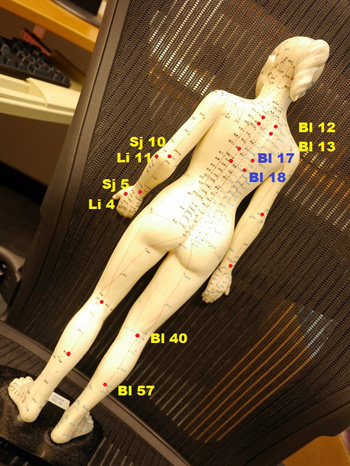 Acupuncture points for skin itching
Acupuncture points for skin itching
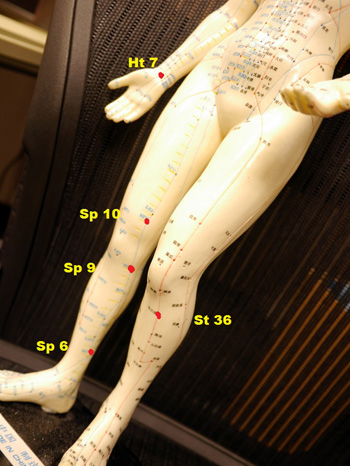 Acupuncture points for skin itching
Acupuncture points for skin itching
Auricular therapy to stop itchy skin
Auricular stimulation is one of the popular Chinese methods. It involves stimulating points on the ears that correspond to different organ systems of the body, in order to achieve general or local effects. The way to stimulate the ear points can be needling, sticking seed patches, blood-letting, or moxa heating. Auricular therapy is often used along with other treatment methods to enhance the overall efficacy and speed recovery. Below is a protocol for skin itching.
Selected points: shen men, lung, occipital, endocrine and adrenal gland (see the graphic). Methods: Select three to four points on one side, and place on the seed patches. Press for 4~8 times every day, and each time last for about 5 minutes. Change the patches to alternative side every three days.
For acute itchiness, it may be suitable to apply blood-letting method. Rub the back of an ear with alcohol cotton ball to clean and sterilize the area, prick on a vein quickly and squeeze gently to release 4~5 drops of blood, then press the punctured point with a clean swab to stop bleeding. This can be done every two days, prick on alternative side each time, 10 times are as one course of treatment. Those who have bleeding problem, anemia, hypotension or pregnant women are NOT recommended.
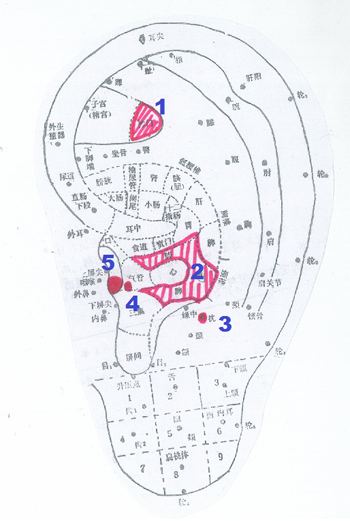 1. Shen men 2. Lung 3. Occipital 4. Endocrine 5. Adrenal gland
1. Shen men 2. Lung 3. Occipital 4. Endocrine 5. Adrenal gland
Navel therapy to stop itchy skin
The navel, also called shen que (Cv 8), is an important therapeutic body point in TCM. Navel dressing is a popular therapy for activating qi flow and promoting internal balance. Physicians usually prescribe an herbal mixture for patients to do it at home. Below are the anti-itch prescriptions for the dressing mixture.
- Ledebouriella root (15g), caltrop fruit (15g), common cnidium fruit (15g), belvedere fruit (15g), dictamnus root bark (15g) and peppermint (10g); grind into fine powder and store in a container. This is suitable for generalized itchiness in particular associated with chronic hives.
- Chinese safflower, arnebia root, gardenia fruit and Chinese rhubarb root, equal amount for each; grind into fine powder and mix with borneol (10g), store in a container and put aside.
- Chinese safflower, peach kernel, bitter apricot seed and gardenia fruit, for 100g each; grind into fine powder and mix with borneol (10g), store in a container and put aside.
- Angelica root, white peony root and rehmannia root, for 30g each; dwarf lily-turf tuber, Chinese senega and unprocessed fleeceflower root, for 20g each; sopora root, belvedere fruit, dictamnus root bark, and Sichuan Chinaberry, for 15g each; scorpion and centipede for 10g each; pan roast all the ingredients to dehydrate, and then grind into powder mixture, store in a container and put aside.
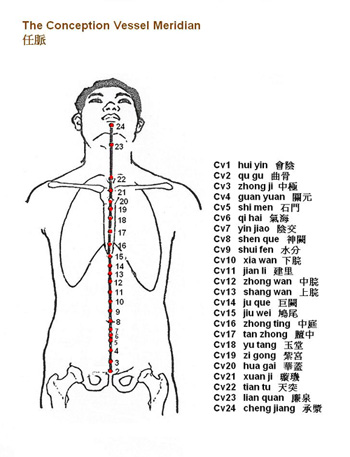 The Conception Vessel Meridian
The Conception Vessel Meridian
Further Readings:
holistic concept meridian system organs blood qi (vital energy) yang meridians yin meridians acupuncture techniques regulating effects of acupuncture

